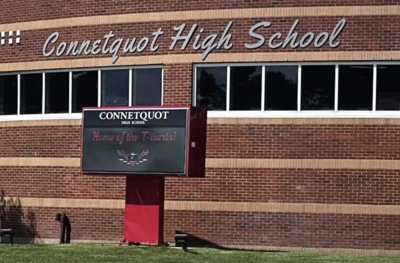ARTICLE AD BOX

When Connetquot Central School District, located in the suburbs of New York City, voted this week to retire its “Thunderbirds” nickname — the name long used to represent its sports teams, it seemed like the end of a long legal battle.
In reality, it marked the beginning of a sharper debate: can a simple rebranding to “T-Birds” satisfy the letter of the law while ignoring its spirit? The district, based on Long Island, reached a settlement with the state after months of resistance to New York’s 2023 regulation mandating the retirement of all Native American sports names and mascots. According to the Associated Press, the deal permits Connetquot to continue using imagery such as eagles or lightning bolts, provided it can attest that the shortened “T-Birds” moniker has “never been associated with any Indigenous imagery of any kind.”
The compromise allowed the district to withdraw its appeal of a federal judge’s dismissal of its earlier lawsuit against the regulation.
The Thunderbird’s cultural weight
For Native American advocates, however, the change is cosmetic at best. John Kane, a member of the Mohawk tribe in upstate New York, told AP that the term “Thunderbird” cannot be separated from its Indigenous roots. In Native traditions, the Thunderbird is more than a name: it is a mythological spirit, a protector linked to storms, and a recurring figure in oral histories.
“Don’t ask me what the white origins of ‘Thunderbirds’ is except for the car or John Travolta’s gang in Grease,” Kane quipped, underscoring how popular culture has casually adopted, and diluted, the symbol. Over the decades, the word has appeared everywhere from Ford’s convertible line to the U.S. Air Force’s aerial demonstration team, further complicating the debate about cultural ownership.
Legal battles and local divides
Under the proposal, Connetquot could theoretically revert to the “Thunderbirds” name if the state regulation is overturned or repealed.
But even this hedge underscores the district’s reluctance to let go. The controversy extends beyond Connetquot. Neighboring Massapequa, another Long Island district, has refused to drop its “Chiefs” logo, which features a Native American headdress. In a statement carried by AP, its board of education called Connetquot’s compromise “deeply disappointing” and vowed to “never back down” in preserving its imagery. At the federal level, the U.S. Department of Education, under Secretary Linda McMahon, has gone further, questioning whether New York’s mascot ban is itself discriminatory. As AP reported, federal investigators determined the policy violated Title VI of the Civil Rights Act because it permitted mascots derived from other ethnic groups, such as “Dutchmen” and “Huguenots.” During a visit to Massapequa, McMahon urged New York to rescind the ban altogether.
A compromise with no winners?
For scholars, the settlement highlights the messy intersection of identity, law, and local politics. Joseph Pierce, director of Native American studies at Stony Brook University, told AP that the new nickname risks making little practical difference. “In my view, this is a case where nobody really wins,” he said. “It is a shame that people are litigating over this, rather than understanding that Native American people, imagery, and symbols, including the Thunderbird, are not theirs to use.”
Beyond semantics
The story of the “Thunderbirds” is more than a clash over a school mascot. It raises uncomfortable questions: how much change is meaningful, and when does compromise turn into evasion? For Native communities, the issue is not about semantics but about sovereignty over culture. For school districts, it has become a battle over tradition, identity, and federal oversight. As lawsuits continue and districts dig in their heels, the question remains: can a simple name swap resolve generations of cultural borrowing, or does it merely rename the conflict?



.png)
.png)
.png)
















 2 days ago
3
2 days ago
3







 English (US) ·
English (US) ·